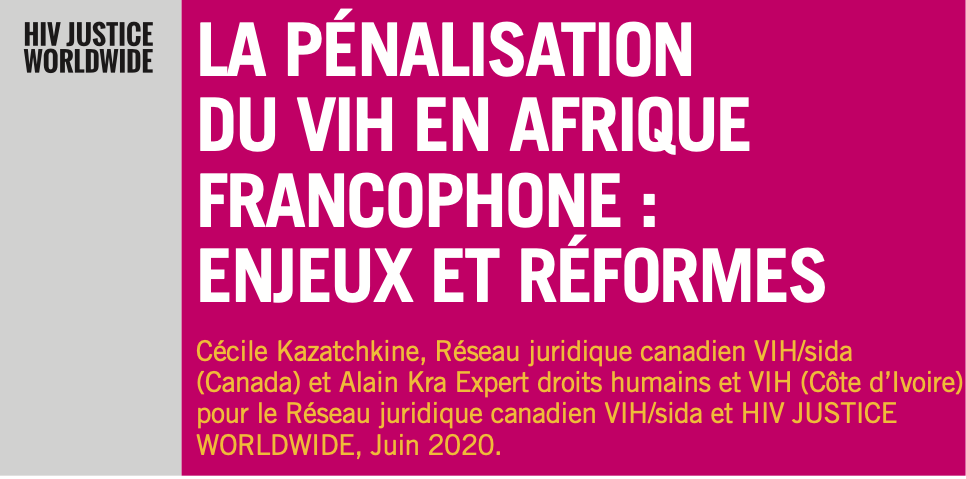
Today, HIV JUSTICE WORLDWIDE releases a new advocacy factsheet developed by and for Francophone activists engaged in the fight against HIV criminalisation in Francophone Africa.
Co-authored by Cécile Kazatchkine of the Canadian HIV/AIDS Legal Network and Alain Kra, an expert in HIV and human rights Expert from Côte d’Ivoire, on behalf of HIV JUSTICE WORLDWIDE, the factsheet is the first of several that will be published throughout the year focusing on a particular language and region.
“We are delighted to share this new resource with you today,” Cécile Kazatchkine writes below. “In it, you will find everything you need to know about HIV criminalisation in francophone Africa, the issues it raises and the strategies adopted by activists to address it. Many thanks to Alain Kra, an expert in human rights and HIV from Côte d’Ivoire, who co-authored this factsheet, and to our colleagues from the Francophone HIV JUSTICE WORLDWIDE network for their contributions and for sharing their experiences.”
Nous sommes heureux de partager aujourd’hui cette nouvelle ressource développée par et pour les militants francophones engagés dans la lutte contre la pénalisation du VIH. Vous y trouverez tout ce que vous devez savoir sur la pénalisation en Afrique francophone, les enjeux qu’elle soulève et les stratégies adoptées par les militants pour y répondre. Un grand merci à Alain Kra, Expert en droits humains et VIH de Côte d’Ivoire et co-auteur de ce feuillet d’information ainsi qu’à nos collègues du réseau francophone HIV Justice Worldwide pour leurs contributions et le partage de leurs expériences.
Cécile Kazatchkine, le Réseau juridique canadien VIH/sida
To provide a taste of the content to English-speakers, here are some of the introductory paragraphs from the 16-page PDF.
“African HIV legislation was drafted on the basis of the N’Djamena model law developed during a three-day workshop in 2004 organised by Action for West Africa Region-HIV/ AIDS (AWARE-HIV/AIDS) and funded by the United States Agency for International Development (USAID). This model, presented as a tool for the rapid dissemination of “good practices”, has led to a veritable “legislative contagion” in terms of HIV criminalisation across the continent, particularly in francophone Africa.
“Nineteen countries in francophone Africa currently have HIV-specific laws. Sixteen of these laws, which are supposed to guarantee the rights of people living with HIV, also criminalise HIV transmission or exposure. Criticism of the model law and a better understanding of the risks associated with HIV criminalisation have led to the revision of some laws in Togo, Guinea and Niger to limit the scope of HIV criminalisation.
“Similarly, criminal provisions in HIV laws adopted in 2010 in Senegal, 2011 in the Congo and 2014 in Côte d’Ivoire are more protective of the rights of people living with HIV. Like the revised laws, they include provisions expressly excluding criminalisation in certain circumstances, such as where condoms have been used or in cases of mother-to-child transmission. Congolese law precludes criminal liability in the greatest number of circumstances. In Cameroon and Gabon, HIV bills with provisions criminalising HIV were eventually abandoned, while in Comoros and Mauritius, HIV laws have never included criminalising provisions. Finally, in the Democratic Republic of Congo (DRC), the section of the HIV law criminalising the ‘deliberate’ transmission of HIV was repealed in 2018.”
The information sheet goes on to cover the disproportionate impact of HIV criminalisation on women across Africa; shows the many reasons why HIV criminalisation does more harm than good to the HIV response; explores the impact of science on laws and prosecutions; and includes links to further resources including those contained in the French-language version of the HIV Justice Toolkit.